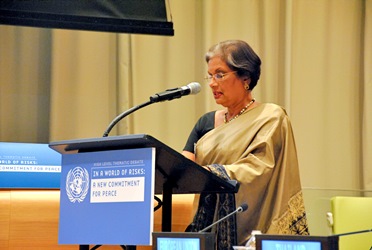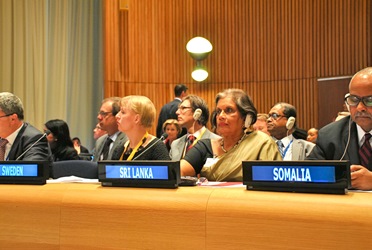The fifth executive president of Sri Lanka and Chairperson, Office for National Unity and Reconciliation, Chandrika Kumaratunga delivered the Sri Lanka statement on International Peace and Security at the UN headquarters in New York just moments ago.
Former President Kumaratunga is in New York to attend the High Level Thematic Debate on UN, Peace and Security, titled, In a World of Risks: A New Commitment for Peace taking place on 10 and 11 May at the Trusteeship Council, UN Headquarters.
In her statement Mrs. Kumaratunga said that Sri Lanka wholeheartedly condemned terrorism in all its forms and manifestations, stating it was a scourge extending beyond national borders.
"Terrorism has become today, the single most terrifying and destructive phenomenon of our modern world. As a victim of the horrors of terrorist violence, Sri Lanka understands the national and international challenges posed by terrorist politics, and we encourage genuine efforts to strengthen the UN system, its reach and effectiveness in addressing this issue" she said.
"Countering threats from terrorist organizations would only deal with the outward manifestation of the problem. In responding to the challenges to peace and security, one must adopt a holistic view and look deep into their genesis and causes. Work by scholars confirms that the principal cause of dissent and violent conflict is the existence of social, economic and political inequalities and marginalization.” 
Mrs. Kumaratunga offered Sri Lanka as a beacon of hope to the world as the international community faced one of its most complexes challenges.
"Sri Lanka" she said "has been able to emerge from a dark period of conflict. Since January 2015, a new president and a national unity government has been elected, committed to democratic values, and to moving forward as an engaged member of the world community. In coordination with UN agencies and our many friends in the international community, we have already started taking steps aimed at achieving meaningful reconciliation, strengthening democratic institutions, good governance, the restoration of the rule of law, political power sharing and confidence building among communities affected by conflict for many years. We have renewed our commitment to gender equality and women’s empowerment."
"Yes, we are in a world of risks," she concluded, "and given the threats we face today, there is no time more urgent than now to muster the political will to meet these challenges.
"We are already seized of the building blocks to formulate a comprehensive response to these threats to international peace and security. I offer our own experiences in Sri Lanka as a measure of hope for the world, as we face these threats together" Mrs. Kumaratunga said.
Tomorrow the former President will be the main speaker and panelist at an Interactive Session titled Leading by Example: Innovative Partnerships and Responses, where she will elaborate on Sri Lanka's experiences, its reconciliation mechanisms based on the four pillars of Truth-Seeking, Justice, Reparations and Non-Recurrence, and the work of the Office of National Unity and Reconciliation which she chairs.
10 May 2016
Permanent Mission of Sri Lanka to the United Nations
New York, New York
High-Level Thematic Debate on UN, Peace and Security - "In a World of Risks: A New Commitment for Peace"
Statement by:
President Chandrika Bandaranaike Kumaratunga
Chairperson of the Office for National Unity and Reconciliation
In a World of Risks: Today’s Threats to International Peace and Security
United Nations Headquarters, New York
Mr. President,
Let me take this opportunity to thank you for convening this most important Plenary and Ms. Leymah Gbowee and His Excellency Ambassador Moussa for their opening statements.
Sri Lanka wholeheartedly condemns terrorism in all its forms and manifestations, which is a scourge not exclusive to any one country or region, extending its reach beyond national borders. This rising transnational phenomenon challenges existing borders of states, and threatens the very fabric of the principle of sovereign states upon which the international legal order is based. Indeed, Sri Lanka’s long conflict was substantially sustained by transnational networks.
Terrorism has become today, the single most terrifying and destructive phenomenon of our modern world. As a victim of the horrors of terrorist violence Sri Lanka understands the national and international challenges posed by terrorist politics, and we encourage genuine efforts to strengthen the UN system, its reach and effectiveness in addressing this issue.
We continue to be deeply concerned over the acute and growing threat of foreign terrorist fighters (FTFs). These are not phenomena that a single State or few States could deal with but demand a concerted global effort. It is therefore imperative for all Member States to pool their resources and share their intelligence to counter this issue.
With tens of thousands of fighters hailing from over 100 States, it is imperative to harness global support and respond more aggressively to these threats to international peace and security. We have also to look at new and innovative ways to counter this growing threat.
Mr. President,
I dare say that countering threats from terrorist organizations would only deal with the outward manifestation of the problem. In responding to the challenges to peace and security, one must adopt a holistic view and look deep into their genesis and causes. Work by scholars confirm that the principal cause of dissent and violent conflict is the existence of social, economic and political inequalities and marginalization. Perceived injustice engenders violent or terroristic responses from the victims of that injustice.
It has been demonstrated time and again, that inclusive and integrated societies give rise to sustained peace and stability.
Mr. President,
Today, terrorism targets vulnerable and marginalized communities, children, women and girls. It is therefore imperative, that we proactively include and engage those entities of the United Nations System that deal with these groups. The eradication of poverty, in concert with increased social and economic opportunities is essential to counter human frustration and the threat of radicalization.
This calls for a coordinated and concerted approach from the UN agencies, and therefore, we welcome the recommendations in the Global Study on the Implementation of Resolution 1325 on Women Peace and Security led by prominent Sri Lankan expert Radhika Coomaraswamy released last year.
We welcome all vital Security Council Resolutions and Conventions adopted in the General Assembly on countering terrorism.
In conclusion, Mr. President, I offer a word of hope. Sri Lanka has been able to emerge from a dark period of conflict. Since January 2015, a new president and a national unity government has been elected, committed to democratic values, and to moving forward as an engaged member of the world community.
In coordination with UN agencies and our many friends in the international community, we have already started taking steps aimed at achieving meaningful reconciliation, strengthening democratic institutions, good governance, the restoration of the rule of law, political power sharing and confidence building among communities affected by conflict for many years. We have renewed our commitment to gender equality and women’s empowerment.
The Office for National Unity and Reconciliation (ONUR) which I head, has been established to lead, facilitate and support national unity and reconciliation in Sri Lanka. Our achievements include drafting a national policy on reconciliation, infrastructure development plans for conflict affected areas, launching inter-faith programs, arts and culture programs, promoting education reforms to include peace, education and national unity components, psycho social programs for war-affected persons, facilitating the issuance of certificates of absence, facilitating the return of lands taken over by the military in the former conflict-affected areas, and language policy implementation. We also coordinate the consultation process facilitating the drafting of a new Constitution, which would guarantee minority rights.
Mr. President,
Yes, we are in a world of risks, and given the threats we face today, there is no time more urgent than now to muster the political will to meet these challenges. We are already seized of the building blocks to formulate a comprehensive response to these threats to international peace and security. I offer our own experiences in Sri Lanka as a measure of hope for the world, as we face these threats together.
Thank you.


